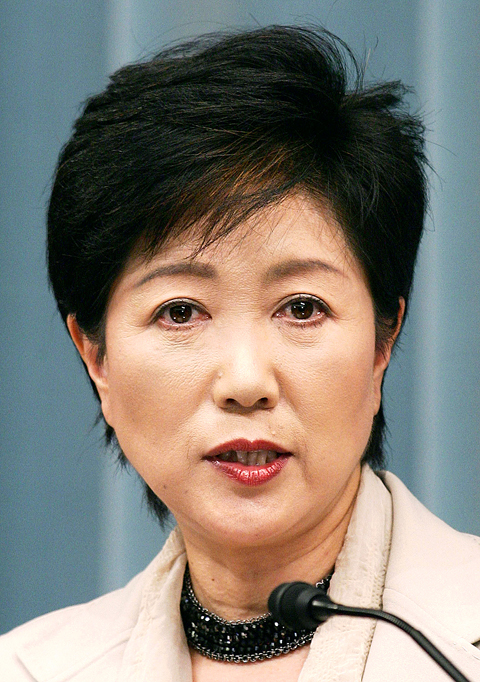Japan for the first time has a chance of a female prime minister in Yuriko Koike, but feminists are skeptical on whether she would do the country’s women any good.
Koike has hinted she may run in the Sept. 22 race within the ruling Liberal Democratic Party (LDP) to replace unpopular Prime Minister Yasuo Fukuda, who abruptly resigned last Monday.
The former TV anchorwoman would be the first woman to seek the prime minister’s post in male-dominated Japan, which has some of the world’s lowest rates of female representation in politics and business.

PHOTO: AFP
“I welcome a female candidate running in the election — generally speaking,” said Mitsuko Shimomura, a journalist and one of the founders of Win Win, a lobby for female politicians similar to the US Emily’s List.
“But her bid to become the first woman prime minister would do nothing to increase the social standing of Japanese women,” she said. “Many women around me feel sick to their back teeth.”
“As a politician, Ms Koike has never been enthusiastic about improving women’s social status as that agenda turns off men,” she said.
Koike, 56, who speaks fluent English and Arabic, made her name as an environment minister and an expert on foreign policy, rarely stressing her gender.
In an oblique reference during her brief tenure as defense minister last year, Koike likened herself to US Secretary of State Condoleezza Rice and told a US audience to call her “Madam Sushi” — a joke that fell flat back home.
Koike entered politics in 1992 and has faced criticism for cozying up to those in power at the time.
She was initially a protegee of Ichiro Ozawa, then an LDP heavyweight and now chief of a resurgent opposition — which hopes to defeat the long-dominant but now ailing ruling party in approaching general elections.
After a turbulent political decade, Koike entered the LDP in 2002.
Her latest political patron was reformist prime minister Junichiro Koizumi, who was popular during his 2001-2006 tenure. Koike now belongs to the largest faction in the LDP, along with Koizumi and many other party heavyweights.
Koike’s shrewdness was illustrated in the 2005 general election when she volunteered to switch her constituency and ran as an “assassin” candidate against an LDP member.
Kanako Otsuji, an opposition member who made an unsuccessful bid last year to be Japan’s first openly lesbian member of parliament, welcomed Koike’s bid as a move to break Japan’s glass ceiling.
“What’s important is that people physically see a woman stand as prime minister in parliament and answer questions from the opposition,” Otsuji said. “It’s a different story on whether she would uphold policies that are good for women.”
Also See: Japan’s rapid succession of prime ministers belies its global role

‘EYE FOR AN EYE’: Two of the men were shot by a male relative of the victims, whose families turned down the opportunity to offer them amnesty, the Supreme Court said Four men were yesterday publicly executed in Afghanistan, the Supreme Court said, the highest number of executions to be carried out in one day since the Taliban’s return to power. The executions in three separate provinces brought to 10 the number of men publicly put to death since 2021, according to an Agence France-Presse tally. Public executions were common during the Taliban’s first rule from 1996 to 2001, with most of them carried out publicly in sports stadiums. Two men were shot around six or seven times by a male relative of the victims in front of spectators in Qala-i-Naw, the center

Incumbent Ecuadoran President Daniel Noboa on Sunday claimed a runaway victory in the nation’s presidential election, after voters endorsed the young leader’s “iron fist” approach to rampant cartel violence. With more than 90 percent of the votes counted, the National Election Council said Noboa had an unassailable 12-point lead over his leftist rival Luisa Gonzalez. Official results showed Noboa with 56 percent of the vote, against Gonzalez’s 44 percent — a far bigger winning margin than expected after a virtual tie in the first round. Speaking to jubilant supporters in his hometown of Olon, the 37-year-old president claimed a “historic victory.” “A huge hug

Canadian Prime Minister Mark Carney is leaning into his banking background as his country fights a trade war with the US, but his financial ties have also made him a target for conspiracy theories. Incorporating tropes familiar to followers of the far-right QAnon movement, conspiratorial social media posts about the Liberal leader have surged ahead of the country’s April 28 election. Posts range from false claims he recited a “satanic chant” at a campaign event to artificial intelligence (AI)-generated images of him in a pool with convicted sex offender Jeffrey Epstein. “He’s the ideal person to be targeted here, for sure, due to

DISPUTE: Beijing seeks global support against Trump’s tariffs, but many governments remain hesitant to align, including India, ASEAN countries and Australia China is reaching out to other nations as the US layers on more tariffs, in what appears to be an attempt by Beijing to form a united front to compel Washington to retreat. Days into the effort, it is meeting only partial success from countries unwilling to ally with the main target of US President Donald Trump’s trade war. Facing the cratering of global markets, Trump on Wednesday backed off his tariffs on most nations for 90 days, saying countries were lining up to negotiate more favorable conditions. China has refused to seek talks, saying the US was insincere and that it